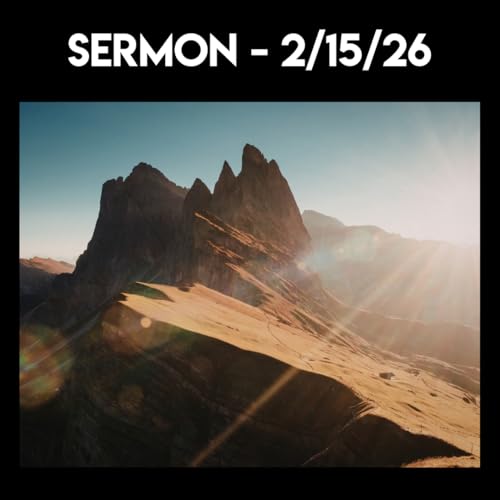Fourth Sunday after Epiphany February 1, 2026 Faith Lutheran, Okemos Micah 6:1-8, Psalm 1, I Corinthians 1:18-31, Matthew 5:1-12 Your Kingdom Come, Your Will Be Done, On Earth as in Heaven… Our Father in heaven, in each moment, in each day we pray your kingdom come, your will be done on earth as in heaven. Your kingdom come, your will be done… I been thinking about our sister congregation, Immanuel Lutheran in Grand Ledge. Their pastor, Chuck Forrester, has been on leave from call for several months because of a serious medical condition. For the last five months, God provided Pastor Chrisy Bright to serve Immanuel. Chrisy, a young pastor, most recently served as an assistant to former Bishop Satterlee, and now for at least the next three months is Immanuel's contracted pastor. In this present moment this morning she is preaching the good news of God's love in Jesus Christ to the people of Immanuel. God provided both work for a gifted pastor now without a letter of call, and pastoral leadership for a congregation whose called pastor's return remains uncertain. An answer to most powerful of all prayers: Your kingdom come, your will be done… One year ago today, Pastor Megan was ordained, and the very next day, she served as our pastor. Surely, in this moment in the story of Faith Lutheran Church, God provided for us a shepherd abounding in compassion and joy in a time in our society when so much is uncertain. Both Immanuel and Faith have been blessed too with exceptionally wise lay leaders and brilliant musicians, so reassuring during this past tumultuous, fear-filled year in our country when the foundations of our democracy seem very tenuous. In ways we may not have readily recognized, our praying the Lord's prayer week after week did not go unheard. In both congregations, in this fragile time for all of us, signs of the kingdom, signs of the reign of our Father and his Son, signs of God's steadfast, faithful, loving presence… We are so blessed. [In a Zoom call on Wednesday with three other former bishops, Floyd, Marcus, and Jerry, Floyd proclaimed that, for him. these readings for today from Micah, Psalm 15, I Corinthians, and Matthew were maybe the best ones in all of our three-year cycle of biblical texts. Surely, they all are very beautiful and challenging and powerful as such a time as this.] Many of us know by heart, or have at least heard these famous words from the prophet Micah, plain-spoken words we are called to live out until we take our last earthly breath: He [God] has told you, O mortal, what is good, and what does the Lord require of you but to do justice and to love kindness and to walk humbly with your God? Less familiar, but no less powerful and reassuring are the words of Psalm 15, words for each of us in each moment of each day, for all of us who are daily bathed in God's forgiving love. Please read them with me in their entirety: LORD, who may dwell in your tabernacle… [vs.4b: They are willing to do the right thing, to stand by their oath even to their own hurt.] And then these opening words from I Corinthians 1:18 revealing the seemingly contradictory way God has chosen to save us: The message of the cross is foolishness to those who are perishing, but to us [most of whom are probably not all that worldly wise or powerful] to us who are being saved it is the power of God. How ludicrous to worldly wisdom and worldly power and might to believe that a man accused of treason, who dies on a cross, would thereby takes away the sin of the world. But it is God's wisdom that Jesus' cruel death would be the very way God would save us from our deep brokenness and alienation from each other and from the One who so loves us, so heals us, so day by day rekindles our faith in and hope and love for our Maker and Redeemer and for our friends and enemies alike. And then, even more, the beatitudes in Matthew 5 as Jesus sat down and to his disciples long ago and to us this morning began his sermon on the mount. Hear the beatitudes, these blessings in a translation, a rendering by Steve Garnaas-Holmes, a friend of Pastor Megan's: Blessed are you who have nothing to offer, for you are offered everything. Blessed are you who are broken-hearted for the world, for God weeps with you, and will rejoice with you. Blessed are you who do not seek to dominate, for love dominates your life. Blessed are you who sacrifice for the sake of justice, for you will know victory. Blessed are you who are gentle, for God's gentleness enfolds you. Blessed are you who seek only love, for God will be everywhere for you. Blessed are you who remain peaceful in conflict, for so you reveal God. Blessed are you who are treated harshly, for God treats you to the entire realm of God. Blessed are you who are ...
Más
Menos
 Feb 15 20264 m
Feb 15 20264 m Feb 15 202616 m
Feb 15 202616 m Feb 1 20263 m
Feb 1 20263 m Feb 1 202618 m
Feb 1 202618 m Jan 25 20264 m
Jan 25 20264 m Jan 25 202623 m
Jan 25 202623 m Jan 18 20263 m
Jan 18 20263 m Jan 18 20263 m
Jan 18 20263 m
